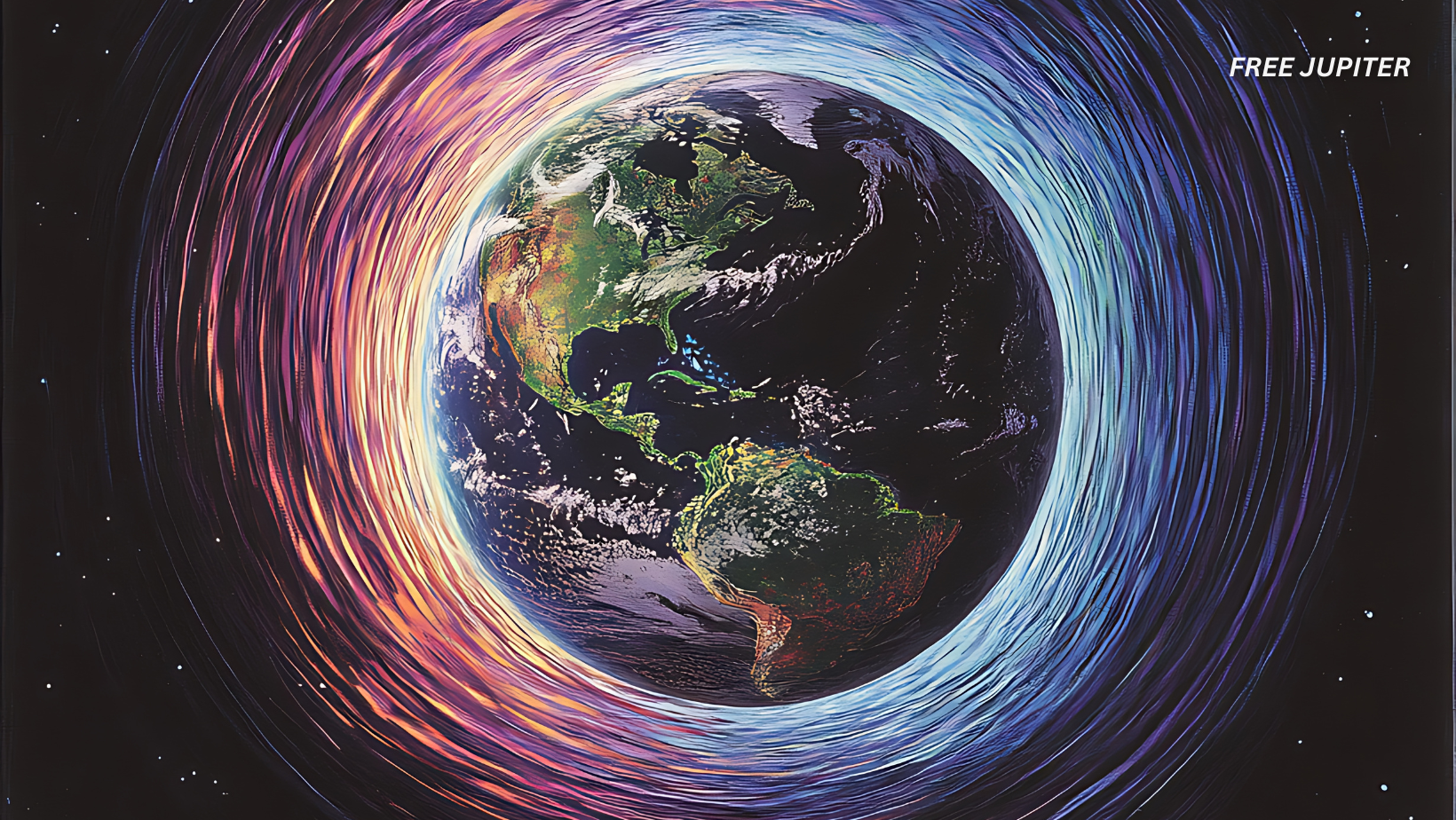Friendly Note: FreeJupiter.com shares general info for curious minds 🌟 Please fact-check all claims—and always check health matters with a professional 💙
Most of us think of time as something steady, almost sacred — tick-tocking along like clockwork. But what if the very planet we live on started messing with it? That’s not science fiction. It’s actually happening right now — Earth is rotating faster, and timekeepers around the world are starting to raise their eyebrows.
On certain days this year, Earth is finishing its spin around its axis just a tad quicker than usual. You wouldn’t notice it while sipping your coffee or binge-watching a show, but scientists with ultra-sensitive instruments are watching closely. Why? Because even tiny changes in Earth’s rotation can throw off systems we rely on — from GPS to global banking networks.
Let’s unravel what’s going on, why it matters, and how melting glaciers, the moon, and the planet’s hot, sloshing core are all involved in this ticking time mystery.
The Mystery of the Milliseconds
On July 10, 2025, Earth had its shortest day of the year — a blink-and-you’ll-miss-it 1.36 milliseconds shorter than the standard 24 hours. Two more contenders are on the horizon: July 22 and August 5, predicted to be shorter by 1.34 and 1.25 milliseconds, respectively.
That might not sound like much. After all, one millisecond is just a thousandth of a second. But when it comes to timekeeping on a global scale, even a sliver of a second can throw a wrench in the works.
Why is the length of a day changing in the first place? The basic idea is simple: a day is how long it takes Earth to make one full spin on its axis. We round it to 24 hours or 86,400 seconds. But Earth doesn’t spin like a perfectly tuned machine — it wobbles, shifts, and changes speed ever so slightly thanks to natural forces both inside and outside the planet.
Read more: 63 Earths Can Fit Comfortably Inside Uranus
A Not-So-Silent Symphony: What Affects Earth’s Spin?
Earth’s rotation isn’t just governed by inertia. It’s being nudged constantly by a host of invisible players.
- The Moon’s Gravitational Pull: The moon tugs on Earth just enough to affect ocean tides, and believe it or not, even Earth’s spin. When the moon is directly above the equator, Earth slows slightly. When it’s over higher latitudes, Earth speeds up. It’s like a cosmic dance where the moon subtly drags or nudges Earth depending on its position.
- Seasonal Shifts in the Atmosphere: In summer, large-scale weather patterns, such as the jet stream, shift north or south. These atmospheric changes slow down the air around the planet. But, thanks to physics (specifically the law of conservation of angular momentum), if the atmosphere slows down, Earth’s surface picks up the slack and spins just a bit faster.
- Earth’s Inner Workings: Deep below our feet, Earth’s liquid core has been gradually slowing for decades. When the core slows down, the crust — the part we live on — compensates by speeding up. It’s like a figure skater pulling in their arms to spin faster.
When these elements line up just right, the result is a few days here and there that are ever so slightly shorter than the rest.
Atomic Clocks: The Universe’s Most Accurate Stopwatch
Since 1955, scientists have been using atomic clocks to track time with jaw-dropping accuracy. These clocks measure the energy vibrations of atoms — usually cesium or rubidium — kept in tightly controlled vacuum chambers. The result? A system that’s accurate to within a billionth of a second.
The global time standard, Coordinated Universal Time (UTC), is built using around 450 atomic clocks from laboratories worldwide. This is the time your smartphone, computer, GPS device, and even air traffic control systems rely on.
But here’s where things get tricky: Earth’s slightly irregular spin and the perfection of atomic time don’t always match up. To keep everything in sync, we sometimes need to adjust UTC — and that’s where leap seconds come in.
Leap Seconds: Time’s Tiny Tweaks
To make up for Earth’s slower spin in the past, scientists have occasionally added a leap second to UTC. This is similar to adding a leap day every four years in February — but much smaller.
Since 1972, 27 leap seconds have been added. Most of them came in the 1970s and 1980s. But here’s the twist: Earth has been speeding up in recent decades. In fact, no leap second has been added since 2016.
If the planet keeps spinning faster, we might need to do something totally unprecedented — subtract a second from UTC. This has never happened before. It’s called a negative leap second, and it has experts feeling a little uneasy.
Read more: Birds Can Actually See Earth’s Magnetic Field—Thanks to Quantum Physics
What Could Go Wrong With a Negative Leap Second?
Adding a second is annoying enough. When a leap second was added in 2012, websites like Reddit and LinkedIn crashed. Airlines experienced disruptions. Servers got confused.
Now imagine trying to remove a second from the global timekeeping system. It’s never been done, never tested, and not every system is prepared to handle it. The comparison to the Y2K problem — the infamous computer bug that threatened to wreak havoc in the year 2000 — isn’t far off.
As physicist Judah Levine explains, “Even after 50 years, some systems still handle positive leap seconds incorrectly. A negative leap second would be even trickier.”
The stakes are high. Timekeeping touches almost everything — banking systems, electric grids, telecommunications, air travel, and even military operations. If one of these goes out of sync, the ripple effects could be massive.
Melting Ice: Climate Change’s Unexpected Role
Now here’s a surprising twist: global warming may actually be slowing Earth back down, acting as a brake on this trend of shorter days.
How? When ice melts in Greenland and Antarctica, the resulting water redistributes Earth’s mass by flowing into the oceans. This shift slows Earth’s rotation slightly — just like a spinning ballerina slows when she stretches out her arms.
A 2023 study by Duncan Agnew found that this meltwater is already helping to counterbalance the forces speeding up the planet. Without this melting ice, we might already have needed a negative leap second.
But there’s more: this redistribution of mass also affects Earth’s axis — the invisible line it spins around. Research led by Swiss scientist Benedikt Soja shows that the melting ice is pushing Earth’s spin axis in new directions. If emissions continue to rise, climate change could eventually become the main driver of Earth’s rotation, even overtaking the moon’s gravitational pull, which has ruled for billions of years.
Can We Predict What’s Next?
Sort of — but not perfectly.
Because so many factors influence Earth’s spin, long-term forecasts are shaky at best. Scientists can make short-term predictions based on current data, but beyond a year, it’s like predicting the weather in 2050 — educated guesswork with wide margins of error.
Still, experts believe we’re within the range of normal variability. The faster spin could be a blip, or it could mark the start of a longer trend. “Maybe in a few years,” Soja said, “we’ll see the planet slowing down again. That’s my gut feeling — but you never know.”
Read more: Get Ready For The Shortest Day Since Record Keeping Began As Earth Spins Faster
Time Is a Bit of a Wobbly Illusion
While the thought of Earth spinning faster might sound like a sci-fi plot, it’s very real — and it’s quietly reshaping how we keep track of time. Most of us won’t feel the difference. Our days won’t be noticeably shorter, and we won’t gain or lose time in any dramatic way.
But for the people responsible for synchronizing satellites, preventing bank errors, and ensuring planes don’t fall out of the sky, even a millisecond matters.
Time, as it turns out, isn’t as rock-solid as we thought. And as Earth continues its unpredictable waltz through space, we’ll be adjusting our clocks — and perhaps our expectations — along the way.










